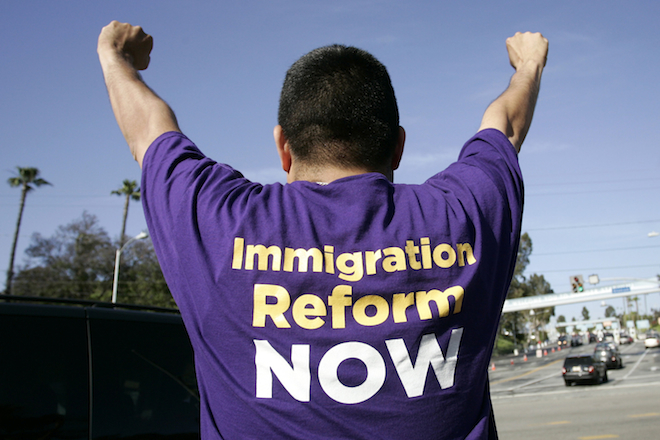As Jeb Bush’s rough week suggests, a path to citizenship is one of the most sensitive issues surrounding immigration reform, a baseline test of seriousness for activists who fear that anything less will create a permanent underclass.
In Bush’s case, his conversion was pretty straightforward. He started the week saying illegal immigrants should never become citizens, full stop, and ended it on a Sunday show tour saying he’d support a plan that lets them become citizens. But the battle over immigration reform is mostly being fought in the grey area in between and immigration activists are worried that a “path to citizenship” is such a broad concept that they might end up with a disappointing policy under the same name. As a result, they’re trying to define the term early.
First, there’s the question of the path’s length. The White House’s leaked bill would grant a provisional legal status to undocumented immigrants who pass a background check and pay fines, but make them wait either eight years or until all the legal immigrants in line ahead of them are processed before applying for a green card — whichever comes first. If it’s the latter (and it probably would be), an individual who received a green card through the process would then have to wait the standard five years before they can apply for citizenship. That puts the total time from legalization to citizenship at a minimum 13 years for most of the 11 million undocumented. The bill does allow for young immigrants who entered the country illegally as children — those covered by the DREAM Act — to potentially become citizens faster if they acquire a high school diploma, college degree, or serve in the military.
So far, the White House is the only plan out there with actual legislative language. But the Senate is working on its own bill, which would prevent immigrants from applying for a green card until new border security measures go into effect. According to a report in the Los Angeles Times, their final plan is likely to require “10 years or longer” before newly legal immigrants can obtain a green card, meaning citizenship is likely 15-plus years off from its passage.
Those timetables are considered too long by a number of immigration advocacy groups, who are pushing to speed up the process. America’s Voice, one of the leading activist groups lobbying for reform, criticized the White House’s leaked plan for being too slow, calling for citizenship in “years, not decades.” Other groups have gotten more specific: United We Dream, which advocates for young immigrants, has called on lawmakers to set the path at seven years — two to a green card, five more to citizenship. PICO National Network, an umbrella group for religious activists, is also pushing for a seven-year path, which one of their staff described to reporters as the “number of completion in the Hebrew and Christian scriptures.”
Ali Noorani, executive director of the National Immigration Forum, told TPM in an interview that the exact number of years was less crucial than revamping the visa system so it can evaluate millions of newly legalized immigrants without running into the same huge backlogs it suffers from now.
“The fact is, there is no road to citizenship for the undocumented now, so you have to build it,” Noorani said. “But like you would build any road, you have to make sure it’s high quality.”
While the issue of when the undocumented population can obtain citizenship gets a lot of attention in the press, partly because it concerns how soon they could vote in elections, activists are at least as focused on defining who qualifies.
“We’re definitely concerned that our opposition could get their hands on the legislation and winnow it down so only a few lucky ones are able to get citizenship,” Noorani said.
Some drafts of immigration legislation in the 2006-2007 debate contained measures that might have limited the total percentage of undocumented that could qualify for legal status — for example, restricting legalization to immigrants who had already been in the country for several years or to those who could show that they had worked throughout their stay. Showing continuous employment could be a potentially burdensome requirement given that so many undocumented workers take off-the-books jobs that are difficult to verify.
Ana Avendano, the AFL-CIO’s director of immigration, noted that criminal background checks, which are considered a given in any reform bill, also could become problematic if they rule out applicants over minor or non-violent crimes, like being arrested at a protest for civil disobedience.
“In Arizona, they’ve practically criminalized sneezing,” Avendano said. “What does that mean for people?”
There’s also a debate over how a bill would apply to prospective immigrants living outside the United States. The White House’s leaked draft would allow newly legalized immigrants to bring spouses and children from abroad under the the same provisional status, an important component for many activists. Religious groups in particular are lobbying for a broad family reunification policy that would make it easier for immigrants of all stripes to sponsor relatives.
House Republicans are still skeptical of citizenship in any form and a final agreement is likely to fall short of activists’ goals in at least some categories. So while each interest group has its own wish list for a bill, they appear to be taking a “we’ll know reform when we see it” approach overall.
“We can’t let the perfect be the enemy of the good,” Avendano said. “But at the same time, people’s lives are not something we can compromise.”






